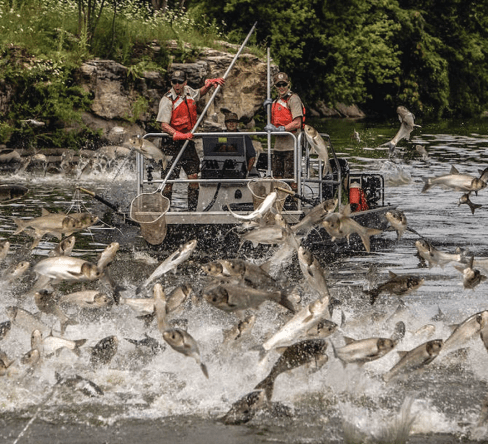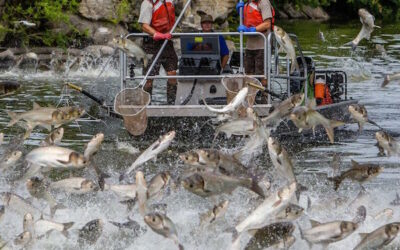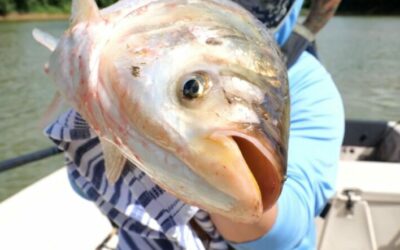Invasive Carp Threaten Tennessee’s Ecosystems
These non-native fish are a serious threat to the aquatic ecosystems, recreation, and economy in Tennessee and surrounding states. The public must do its part to prevent the accidental spread of invasive carp, while calling on elected officials to support policies aimed at managing this threat.
Did you Know?
26.5
pounds of carp have been removed from the Tennessee and Cumberland rivers since 2018.
Source: Tennessee Carp Harvest Incentive Program
60K
of streams and rivers flow across our Volunteer State. Invasive carp have spread from the Mississippi River system to the Tennessee and Cumberland River systems.
$25
has been secured by Tennessee Wildlife Federation and other groups to fight carp throughout the Mississippi River Basin. We’re working hard to do it again.
How Did Invasive Carp Get to Tennessee?
Invasive carp include four non-native species—silver, bighead, grass, and black carp—that were brought to the United States in the 1970s to help maintain ponds used for aquaculture.
Flooding of aquaculture facilities in Arkansas let invasive carp into waterways, and they have since expanded their range throughout the Mississippi River basin and into the Tennessee and Cumberland River systems. The species rapidly spread on their own and can be inadvertently spread by anglers mistaking them for baitfish.
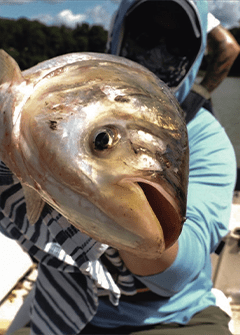
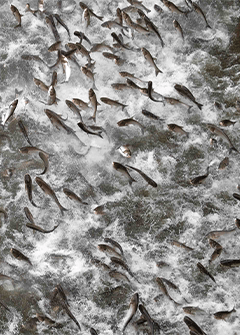
Why Do We Care?
Invasive carp reproduce quickly, have no natural predators, devour food sources native fish rely on, and devastate habitats. Invasive carp, which can grow up to 100 pounds, also threaten boaters’ safety. Silver carp are known to jump when disturbed by boats, striking passengers and causing serious injuries.
If left unaddressed, invasive carp will continue to spread throughout our waterways. As the species’ ranges expand, so will their destruction of native aquatic wildlife—from endangered mussels to bass and other sport fish. Invasive carp degrade the quality of waters, making them less appealing to the anglers and other recreationists that help fuel local economies across the state.
And as anglers stop buying licenses, the state wildlife agency loses critical funding for wildlife conservation of all types. Recreational boaters are also driven away by the threat of jumping silver carp, further damaging local economies.
What Can We Do?
It takes strong leadership and substantial partnerships to successfully solve this problem.
Elected officials at the state and federal levels, Tennessee Wildlife Resources Agency (TWRA), United States Fish and Wildlife Service (USFWS), Tennessee Valley Authority (TVA), and numerous other organizations and agencies are collaborating to most effectively put state and federal dollars to work on the ground.
Funding generated from these efforts has led to:
- Researching and monitoring invasive carp to better understand their movement and reproductivity;
- Supporting the removal of millions of pounds of carp through commercial harvest and infrastructure to improve fish processing and market outlets;
- Planning, prioritizing and designing barriers at key locks and dams to help impede the migration of carp in the Tennessee and Cumberland River Basins.
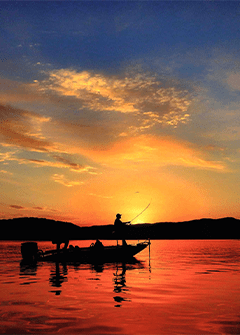
Speak out
Help lead Tennessee's wildlife and habitat conservation movement by making your voice heard.
Give
Your generosity helps manage wildlife populations and restore habitats for a more vibrant Tennessee.
Sign up for action alerts
Learn More
Federation Helps Secure Much-Needed Federal Funds for Invasive Carp Control
Since 2019, the Federation has been integral to the efforts to secure needed federal funding for invasive carp control in Tennessee and the Southeast.
Blocking and Tackling To Stop Invasive Carp on a National Scale
Football and the national effort to stop invasive carp have a lot in common.
Senator Lamar Alexander | 75 years of Tennessee Wildlife Federation
As a two-term governor turned U.S. Senator, Alexander found Tennessee Wildlife Federation to be a critical part of advancing the conservation of our natural world.

